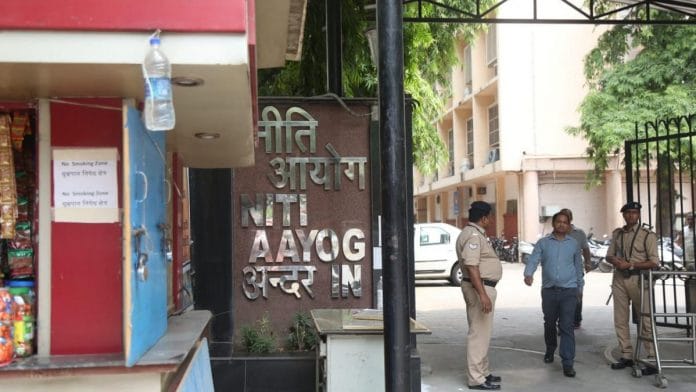New Delhi: The government thinktank NITI Aayog has recruited over 38 experts through lateral entry at the level of director and deputy secretary, ThePrint has learnt, further extending the Modi government’s bid to inject private talent into governance.
According to senior officers privy to the recruitment, offer letters were issued to around 38 appointees on 13 March. Their expertise and roles, the officers said, range from economics and finance, trade and commerce, and data management and analysis, to rural development and infrastructure connectivity.
“Those hired are top-notch professionals from across the globe… And this has been in keeping with the PM’s vision of having a fine balance of domain experts and career bureaucrats in the government,” a government officer said.
Of the 38 appointees, the officers said, around 20 joined the Niti Aayog earlier this month. “Due to Covid-19, some of the joinings have gotten delayed because several appointees are not living in Delhi, or even India,” the aforementioned officer added.
Also Read: How to work like IAS officer — lessons taught to 8 lateral entrants recruited by Modi govt
Not all the same privileges as civil servants
Discussing the appointments process, a second government officer said it was conducted by the Niti Aayog itself and not the Union Public Service Commission (UPSC), which is handling lateral-entry appointments to the central government.
“The recruitments have been done as part of ‘flexi pool posts’, which NITI Aayog had advertised for last year… The UPSC was not involved in this exercise, the persons concerned were selected by the NITI Aayog itself through screening committees headed by the NITI Aayog CEO,” the officer added.
“The approval for the recruitments was taken from the government last year.”
As reported by ThePrint last year, while NITI Aayog has been known to recruit consultants on contracts, the lateral-entry appointees will be overseen by the Central Civil Service Rules, 1964, which govern other civil servants, and they will have the same rank, status, responsibilities and accountability as regular civil servants.
However, according to the NITI Aayog rules, “Officers appointed on contract basis would not be entitled to residential accommodation, official transport, leave encashment or any other allowances/facilities as admissible to a regular government employee.”
This is a departure from the lateral-entry recruitment done by the central government last year through the UPSC. The eight domain experts hired as joint secretaries in September 2019 — as part of the first phase of the scheme — have the same privileges as career civil servants.
They have been recruited for a tenure that will “initially (be) up to 3 years, which can be extended up to 5 years, depending on the requirements or till the age of 60 years, whichever is earlier”, according to the recruitment rules.
“All appointees shall be deemed to be public servants for the purpose of the CSS (Conduct) Rules and such other statutes as notified by the government from time to time. The employment contract can be terminated by either side with a minimum notice period of one month or pay in lieu thereof,” the rules add.
Meanwhile, there is no movement on phase two of the government’s lateral-entry scheme, under which 40 director- and deputy secretary-level officers were to be recruited from the private sector.
“The scheme and the proposal to recruit 40 directors and deputy secretaries stands as is, but there has been no further movement on it as of now,” a senior officer from the Department of Personnel and Training (DoPT) said. “But it will be done in due course.”
Also Read: ‘Lateral entry in civil services vital to state’s ability to deliver to citizens’







It’s against the spirit , rights and scope of the citizens of India.
Scrapping the Planning Commission was a wise act. There the matter should have rested. What Niti Aayog has contributed to the economic development of India – beyond an occasional, tiny uptick in the Ease of Doing Business index – remains an enduring mystery.
1. Bypass upsc
2. Introduce cronies and their agents.
3. Hallowing out govt capacity like it happened in UK
4. Bypass reservation.
5. Bypass talented who clear from lakhs of student and hire foreign Univ educated persons, most of whom are upper caste and form bjp’s NRI support.
6. Degrade Indian universities despite huge talent and competition and value foreign Univ trained moneyed individuals who claim domain expertise.
7. Form policies which has no ground connect and understanding. Only it has ideological underpinning of market liberal fundamentalism which is thoroughly discarded in the West and Europe. This only benefits top 5% of Indian population who have become core BJP supporters.
Ex. Agri reforms-most benefit to traders, core bup supporters. On the other hand excess imports, arbitratrary export ban benefitted traders and leads to losses of farmers kept untouched.
Ex. 2 plight of migrant, labour laws.
You have crony govt. Only more sophisticated than UPA 2 and manages media well. They will only want bigger slice of pie and ignoring size of pie.